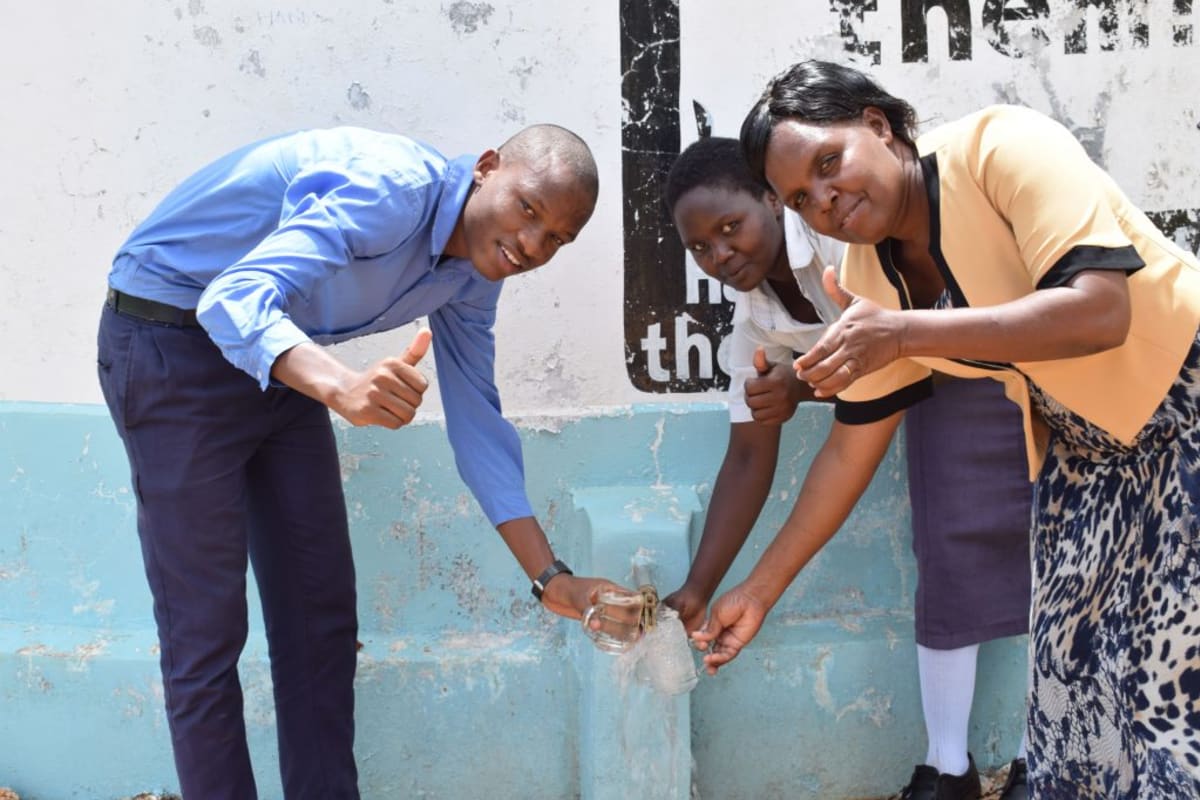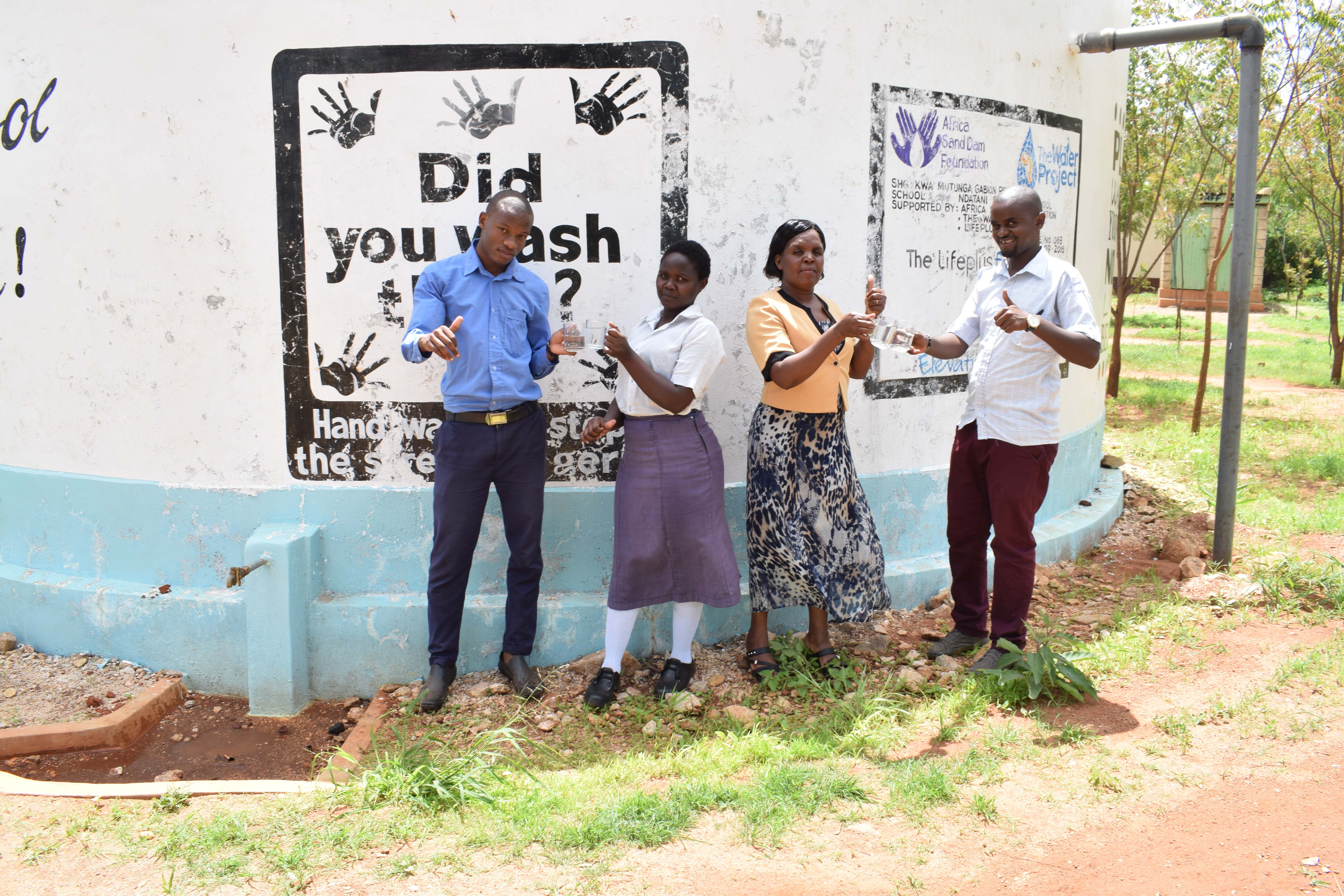This project is a part of our shared program with Africa Sand Dam Foundation. Our team is pleased to directly share the below report (edited for clarity, as needed).
Welcome to the School
Founded in 2011, Ndatani Secondary School is host to 130 boys and 110 girls, 80 of whom board at the school. There are five teachers who are assisted by three subordinate staff.
The school enjoys a close relationship with the Kwa Mutunga Self-Help Group, which is undertaking other projects in the area (a sand dam and hand-dug well). The members of the self-help group are all from Yikivumbu Village. Yikivumbu is a low income area, most of them have no other choice but to send their children to the closet school, which is Ndatani. The students who finish the primary section move up to Ndatani's secondary section. Since the students are going to be spending most of their childhood days at the same facility, the parents have committed themselves to constructing a rainwater catchment tank.
Water Situation
There is a borehole within the school compound. Unfortunately, the water is extremely saline and has been declared unfit for human consumption by researchers from the Ministry of Public Health. At one point, the school had a filter donated to them, but this has since broken down and mechanics have been unable to repair it.
The borehole's water is solar-pumped into a 10,000-liter storage tank that has a secondary 5,000-liter tank that was meant for the filtered water. No filter means both of these tanks are now filled with salty water. In fact, the water is so saline that the cooks can't even use it for meals. The beans and meats do not cook properly, and students get upset stomachs after eating, let alone after drinking. Those two borehole tanks are the only ones the school has for water, and they can really only be used for cleaning and personal hygiene.
In search of drinking water, they have turned to the Kikuu River, which is located three kilometers away. There are local folks paid too fetch water from this source for the school, ferrying the water by donkeys back and forth throughout the day. Whenever the delivery is late, other school activities are late. To avoid being late, the water vendors admit to sometimes fetching water from unprotected sources like scoop holes along the riverbed. This is also a very costly last resort, since these water vendors charge 15 shillings for every 20-liter jerrycan, and the school buys 40 jerrycans every day. This translates to 600 shillings per day and a total of 18,000 shillings a month and 74,000 shillings per school term. These fees are a huge issue for a new school that is still growing, so their finances are strained.
Students who do not board at the school are required to bring five liters of water with them every morning. Since students come from all different directions, it's impossible to know if the water they bring is safe for drinking.
The school needs 1,000 liters of water a day to run smoothly. This is used for cooking, drinking and cleaning. It is also used for science lab experiments and for irrigating the agricultural project plots for the form four agriculture students.
The water shortage at Ndatani Secondary School has hindered proper hygiene, especially for the 80 boarding students. There have also been cases of waterborne disease.
Sanitation Situation
There are 12 pit latrines, but they are not cleaned on a regular basis. There weren't any hand-washing stations either, which are especially critical to have for the boarding students. The school has dug a garbage pit where they pile trash until it needs to be burned.
Apart from mentioning hygiene during science lessons, there's really no strategy to make this a priority on school campus. Teacher Peninah Makau told us, "As a young institution, we want to make the environment conducive for learning. Without a sustainable supply of water in the school, all of our plans are futile."
Plans: Hygiene and Sanitation Training
The facilitator will hold training for one day at the school compound. This will involve students and some of their teachers. CHAST (Children’s Hygiene and Sanitation Training) will be used to teach personal hygiene and how to handle the new rainwater catchment tank. There will be a huge emphasis on how and when to wash hands. Children who attend the training will form a school health club full of students who want to teach their peers about living a healthy life. This club will hold regular meetings and plan for activities and campaigns.
Plans: Hand-Washing Stations
Three hand-washing stations will be delivered before training, so that they can be used for demonstration and practice. Each is a 2500-liter plastic tank fitted with a tap. The school management and the school health club will ensure that there is always water in the tank and that the taps are working.
Plans: Rainwater Catchment Tank
The tank will have a capacity of 105,000 liters. Parents of these students, many who are in the Kwa Mutunga Self-Help Group, will gather construction materials for our artisans.

 Rainwater Catchment
Rainwater Catchment
 Rehabilitation Project
Rehabilitation Project





















